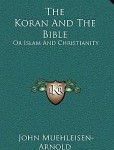The Koran and the Jews – Ask the Rabbi
Q. Why do some parts of the Koran seem so negative towards Jews?
 A. The Koran is quite a different type of scripture than the Bible.
A. The Koran is quite a different type of scripture than the Bible.
The Bible is a vast library of sacred literature arising out of many periods and showing evidence of literary art and redaction, whilst the Koran is basically the work of one man at one period of history.
The Koran was not planned and edited as one literary entity; its contents are an often loose collection of utterances assembled on the mechanical basis of putting the longest chapters first; and Mohammed himself admits that some passages were altered as his viewpoint changed, and during his life new chapters were constantly being added.
Much of his material emanates from Jewish sources, but his use of Biblical material is selective. Some Biblical characters are presented in great detail and with approval; others are clearly disapproved of; some are ignored completely.
His attitude to Jews and Judaism is coloured by the increasing hostility of the Jews towards him and his hostility towards them.
The language he uses is crude and militant. In his book, The Koran and the Bible, J. Muehleisen-Arnold writes (p. 142): “The Koran frequently assumes a polemical bearing towards the Jews and the Jewish religion, and Arab writers frequently frankly admit that Mohammed now and then made alterations in his plan to diminish, as far as possible, the analogy which his creed bore to that of the Jews.
“The Jews are styled the enemies of Moslemin because they killed the Prophets, are bigotted (sic), proud and self-conceited, consider Ezra to be the Son of God, believe Paradise to be created only for themselves, trust to the intercession of their pious ancestors and corrupt their sacred Scriptures.”
Nonetheless, there is much common ground between Judaism and Islam – even more than with Christianity.
Dialogue and co-operation between the two faiths (indeed trialogue between all three monotheistic religions) is in their own interests as well as essential for world peace and harmony.



